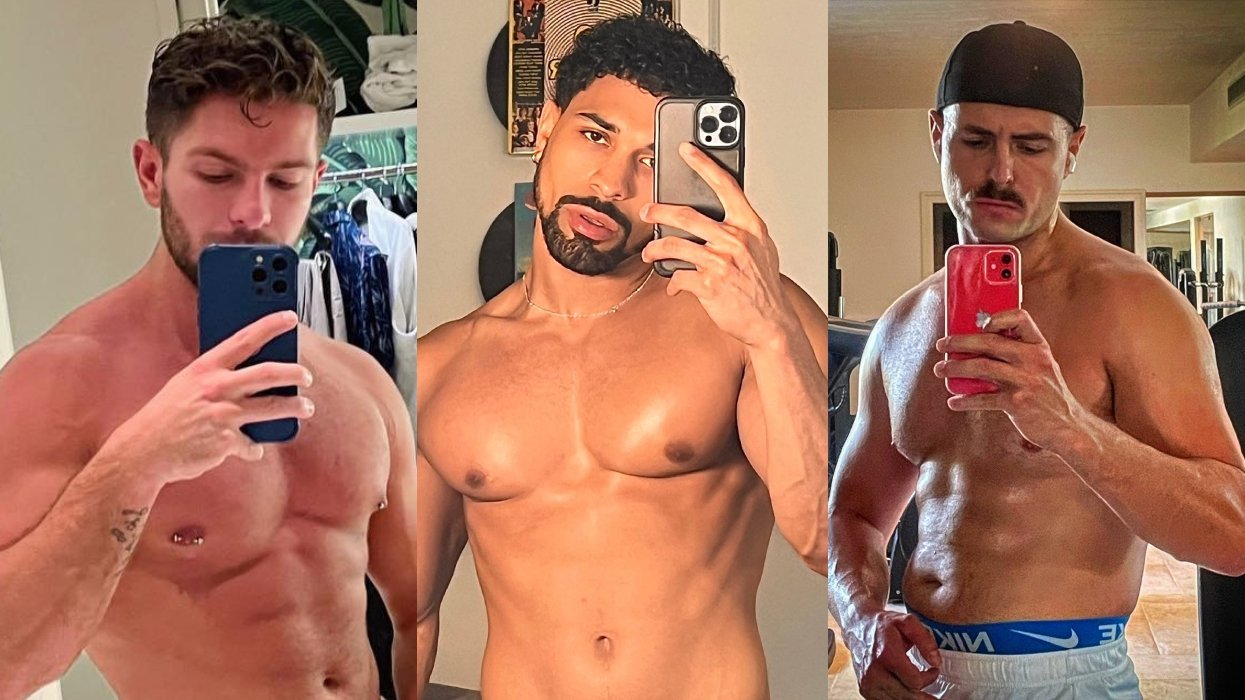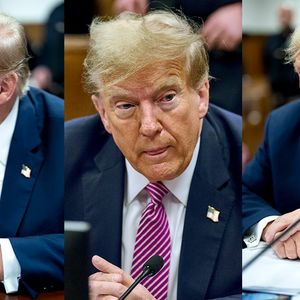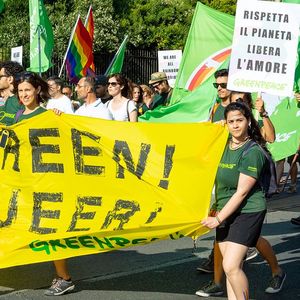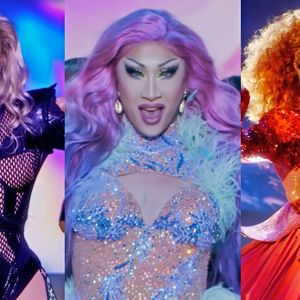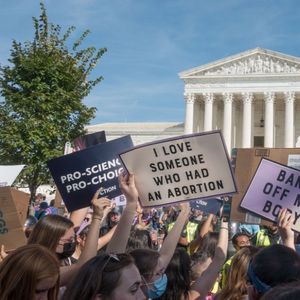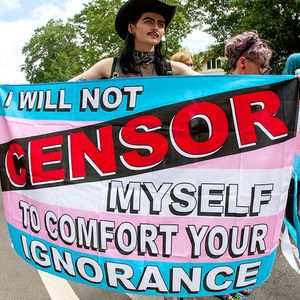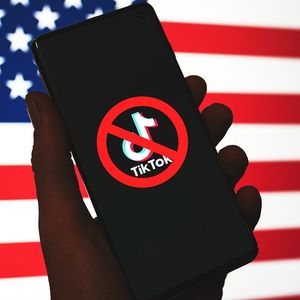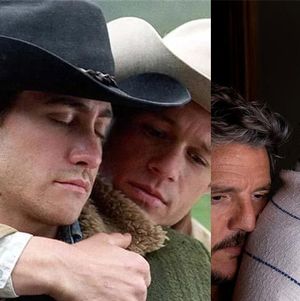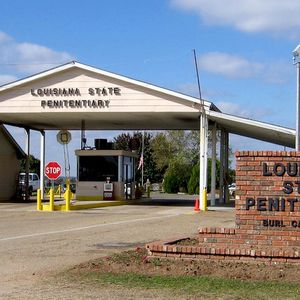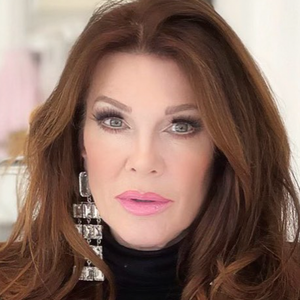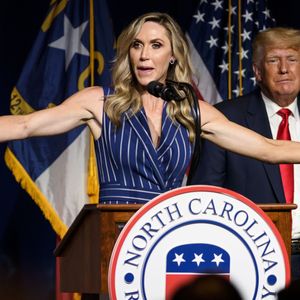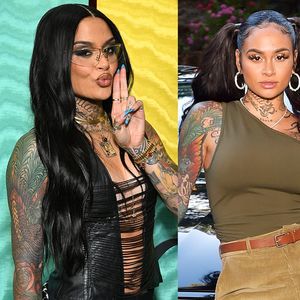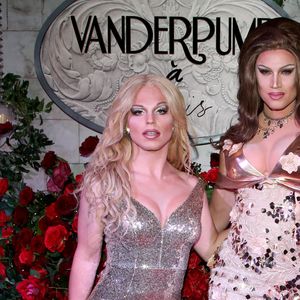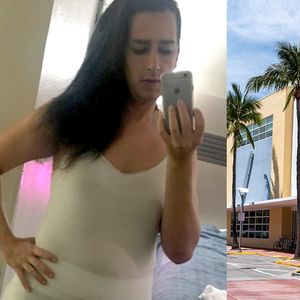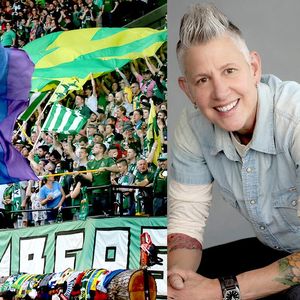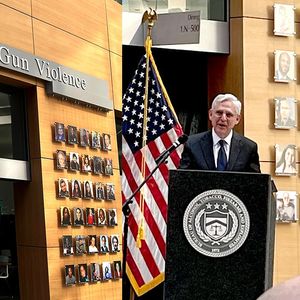CONTACTStaffCAREER OPPORTUNITIESADVERTISE WITH USPRIVACY POLICYPRIVACY PREFERENCESTERMS OF USELEGAL NOTICE
© 2024 Pride Publishing Inc.
All Rights reserved
All Rights reserved
Scroll To Top
By continuing to use our site, you agree to our Private Policy and Terms of Use.
Harvey Milk has finally been given his due. Thirty years after the San Francisco politician's assassination, Gus Van Sant's Milk, starring Sean Penn in the title role and James Franco as his longtime partner, Scott Smith, hits movie theaters November 26. Called 'the first openly gay man elected to any substantial political office in the history of the planet' by Time magazine, Milk was elected to the San Francisco board of supervisors in 1977 and was gunned down inside City Hall along with San Francisco mayor George Moscone a year later. Daniel White, an antigay city supervisor who had resigned earlier that week, confessed to the crime hours later, claiming that junk food had exacerbated his depression, creating what became known as 'the Twinkie defense.' Convicted of manslaughter, White was sentenced to just seven years in prison and was paroled after serving five. Smith was Milk's stabilizing force during his political rise, and the character is ultimately Milk's unifying element, with Franco delicately supporting Penn's sublime performance throughout. For Out, Franco and Milk screenwriter and executive producer Dustin Lance Black, who goes by Lance, talk about the making of the film.
Lance Black: I don't know if it was you or Gus who told me that My Own Private Idaho originally inspired you to act?
James Franco: I probably told you. If Gus told you that, I'd be really touched that he would know.
Lance: I guess the deeper question is, What made you want to do Milk and work with Gus?
James: Well, let me talk about Idaho first, because -- I would watch that movie a lot, even before I was acting. For some reason that struck a chord with me. I know it's an incredibly important film for queer cinema, but I wasn't a young teenager waiting to come out. I don't know what it was. It was just --
Lance: It wasn't just important for gay cinema --
James: No --
Lance: I think that's the whole idea of the movie -- it transcends the gay market with these sort of homoerotic story lines, right?
James: Exactly. I know a lot of straight guys who loved that movie and had the same attachment to it that I did. So very early on I was a huge fan of Gus -- Idaho and Drugstore Cowboy. Matt Dillon and River Phoenix in those movies are in some ways so off-the-wall, but Gus puts them in a certain context where it's completely believable. So it's both moving and hilarious at times. But compared to Drugstore Cowboy, My Own Private Idaho -- I guess just the emotions it touches on made me want to watch it over and over.
Lance: Yeah, me too. That was the first movie I saw of Gus's. I was totally in love with River Phoenix, and then I was surprised by this movie that totally changed my idea of American cinema. It was beautiful.
James: Actually, I saw it and I was like, 'I worship River Phoenix,' and then I was like, 'I want to play a homeless character. I want to play a gay character!' It's the one role I wish I could have done, if I were to think of any.
Lance: Had you met Gus before?
James: Yeah. We have a mutual friend, Ben, a painter whose loft I would paint at. I don't know how close they were, but they were definitely friends, and he was always talking about Gus -- it was the year Elephant won at Cannes. I was doing a little play, The Ape, that I'd cowritten, and Ben brought Gus. And that's basically all I remember from the whole run of that little play -- Gus Van Sant came and saw the play.
Lance: Gus told me about that. When he first brought up your name as someone to play Scott, he said, 'Oh, you know I saw this play, this great play.' And he said, 'You know who's a really good writer, and we might let him read your script?' And I said 'Who?' and he said your name and talked about The Ape.
James: When I was in San Francisco and Gus brought up The Ape again, it was like, 'Wow!' Just that he remembered it made doing that little play all worth it.
Lance: How did you come across Milk?
James: I heard Gus was going to make it, so I wrote him and I was like, 'Gus, I haven't talked to you in a while, but basically I'll do whatever you want in this movie -- I'd just like to be a part of it.' So he sent me a script and I read it and I loved it.
Lance: Had you heard of Harvey Milk?
James: They didn't really teach you about him in school. After I heard Gus was going to do the movie, I watched the documentary The Times of Harvey Milk. And then I asked my parents about it, because they went to Stanford and then stayed in Palo Alto, so they were around at the time and certainly aware of everything. It was definitely in the air where I grew up, but it wasn't taught like Martin Luther King.
Lance: Yeah, not then. But potentially now.
James:Hopefully now. That's one of the great things about the movie finally coming out -- just raising awareness.
Lance: All right, so you always wanted to work with Gus. Did you know about his style of directing? Were there any surprises there?
James: I'm such a big fan. Whenever I had a chance to talk to him, I basically just grilled him on everything -- about every movie. I think he likes talking about his movies, and I mean I did everything -- I did my research. I read his novel, Pink. He has a commentary [on the DVD] for My Own Private Idaho, but for some reason they didn't sync it to the movie, so it's just an audio recording of him and Todd Haynes. So you just have to sit there and listen to the hour-and-a-half or two-hour discussion between them. For me it was incredible. So I knew a lot of the stories just from grilling him.
Lance: Generally, you only know when he's unhappy. It's the difference between a grin and grimace -- which for him is very subtle.
James: I didn't do a ton of improvising, but I felt like if I wanted to say something I could. There were a few times when I threw something out and Gus would be like, 'Yeah'maybe you try not saying that next time.' [Laughs] But other than that it seemed like he was really into any improv, whether it's behavior or a line here or there.
Lance: One of the challenges is that Scott Smith is no longer alive. As a writer, [scenes between Milk and Smith were] difficult for me to write because you really have to create them out of whole cloth. What did you do to research playing a gay man in the '70s?
James: There are two parts of that research: one -- the more general research of the time and place and what it was like to be a gay man in the Castro at that time. And the other side was to research Scott himself. And that was tricky. There's a big thank-you and acknowledgement in the front of [Randy Shilts's book] The Mayor of Castro Street, but there weren't a ton of stories about him. And then in [Rob Epstein's 1984 documentary] The Times of Harvey Milk, he's in it for like five seconds -- he and Harvey kiss, and that's it. So I was having dinner with Rob Epstein and Sean Penn, and I asked Rob if he had any other footage of Scott that hadn't made it into the movie, and Rob is so thorough that he had all these pre-interviews of people who ended up not being interviewed in the film. He had one of Scott from only two or three years after Harvey's death, and so it was perfect material on him. I'm also always a tiny bit skeptical when I hear stories about a real person, because everybody's got their own take on it. When I played James Dean everybody would fight about what the real story was.
Lance: Right, that's tricky.
James: I just tried to talk to [Milk associates] Danny Nicoletta and Cleve Jones and others to get as many perspectives on him as I could. I think Scott was Harvey's longest relationship -- the fact that Scott and Harvey moved out from New York to San Francisco together, the fact that they worked on the early campaigns for Harvey -- it seemed like there was a fairly deep relationship there and they really cared about each other. And so I think that's the Scott we captured in the movie. Harvey was incredibly ambitious and sometimes had these crazy kinds of schemes, and Scott was always there to be the emotional grounding and support.
Lance: Was there anything you did differently in preparing for this movie in terms of looking into gay relationships versus straight ones?
James: At one point during rehearsals, the idea was thrown out that Sean and I would go to the apartment that we eventually shot in and spend a night or two there just to, like -- I don't know what -- feel comfortable with each other? That idea was kind of thrown out but ended up not happening because of scheduling. I approached the relationship part as I would approach any relationship. When I'm working with another actor or actress that I'm supposed to have a relationship with, I'll look for things in the person I like. My other hero on the film was Sean, so it wasn't too hard to look up to him -- or whatever that is.
Lance: You fell in love with Sean? Is that what you're saying?
James: Basically, I've been in love with him since even before Fast Times. He did this little thing called The Beaver Trilogy.
Lance: I have seen that! I can't believe you've seen that -- no one has seen that.
James: So, basically I've been in love with Sean Penn since The Beaver Trilogy. [Squealing girls interrupt in the background, saying, 'I told you it was him! Hi, James Franco! Congrats on getting into the program! You're so great!']
James: Thank you! [Laughs]
Lance: It's got to be hard to be James Franco.
James: I'm sitting on the steps of Brooklyn College. I just had my first writing class. So they were congratulating me for getting into the program. I'm taking an MFA writing program, and also a film directing MFA program at NYU.
Lance: Oh, my God. That's even more than you were taking while we were shooting Milk.
James: Yeah. While I was doing Milk, that was a little crazy. Somehow it worked. There were some days when we were doing night shoots when I would fly from San Francisco to L.A. in the morning, go to class, and then go from UCLA to the airport, fly back, and then work on Milk, but whatever.
Lance: You're a workaholic. You're going to take my writing jobs away from me.
James: If I keep writing things like The Ape, I think you're safe.
Lance: Oh, I want to know what your perception of the vibe on the set was, because we had a lot of straight actors.
James: For me, it seemed like everybody got into it. I was blown away by how meticulous Sean is about the look of the character and the voice and the sound -- just all the care that took. Just how dedicated he was. And then it seemed to me like Emile [Hirsch] -- he was playing young Cleve Jones, who was kind of a young badass -- he wasn't a shy character. So I think Emile really liked being that out there. I don't know if I should talk about Emile, but I think he even asked for that make-out scene with Joseph Cross. And for me it was like, Here I am in Gus's movie, and I'm finally getting as close to being in My Own Private Idaho as I'm going to get, so I'll do whatever. Not a ton is shown in the movie, but there's a scene where I'm naked in the pool and everybody else is dressed and there's just something uncomfortable about that. I felt like the girl in all those teen movies that pops out of the hot tub topless. [Laughs] I was like, All right, it's Gus Van Sant. I'll do whatever. I was just happy to be there.
Lance: Culturally, I thought it was interesting that no one seemed to be cringing or wiping their mouth or getting terrifically freaked out about playing a gay role.
James: Um, we did a little bit. I think Sean and I had the first kiss of the film, and there were like 200 people watching on Castro Street. I was a little nervous. And it was a long kiss.
Lance: That was the three-minute kiss out in front of the entire population of Castro Street, not shut down. Everyone in the Castro came out to watch James Franco and Sean Penn make out.
James: Armistead Maupin came down to watch! [Laughing] So that was weird. It'd be weird kissing a girl in front of all those people. After the first kiss, it broke the ice. And then after our kiss Sean texted Madonna -- his ex-wife, Madonna -- and said, 'I just broke my cherry kissing a guy. I thought of you. I don't know why.' And then she wrote back and said, 'Congratulations.'
Lance: You broke Sean Penn's gay cherry.
James: I did. I did. Now, wait, Lance. Let me think of something to ask you.
Lance: To ask me? They're not taking my picture for the cover of Out magazine.
Read more about the men behind the making of Milk here.
Want more breaking equality news & trending entertainment stories?
Check out our NEW 24/7 streaming service: the Advocate Channel!
Download the Advocate Channel App for your mobile phone and your favorite streaming device!
From our Sponsors
Most Popular
38 Male Celebs Who Did Full Frontal Scenes
November 17 2023 5:18 PM
These are all the celebrities Who came out as LGBTQ+ in 2023
December 31 2023 12:19 PM
29 LGBTQ+ celebs you can follow on OnlyFans
April 18 2024 1:00 PM
26 actors who showed bare ass in movies & TV shows
February 28 2024 1:50 PM
16 times male celebrities had to say they weren't gay
April 17 2024 11:57 AM
21 LGBTQ+ reality dating shows & where to watch them
April 03 2024 4:01 PM
15 Unforgettable Gay Kissing Scenes From TV & Movies
February 14 2024 10:20 AM
14 queens who quit or retired from drag after 'RuPaul's Drag Race'
April 04 2024 12:56 PM
40 steamy celebrity Calvin Klein ads we'll always be thirsty for
January 04 2024 10:54 AM
The 15 Best LGBTQ+ Movies of 2023
December 04 2023 10:32 AM
Watch Now: The Daily
Trending stories from our video partner Advocate Channel.
For more videos and shows go to advocatechannel.com.
Trending stories from our video partner Advocate Channel.
For more videos and shows go to advocatechannel.com.
Latest Stories
10 iconic fictional pop stars in film & TV that we're still stanning
April 24 2024 7:22 PM
A TikTok ban in the U.S. is now even more likely—here's why & what it means
April 24 2024 6:41 PM
10 cringeworthy LGBTQ+ characters in film & TV that had us squirming
April 24 2024 6:22 PM
Kim Petras just dropped out of upcoming concerts — and here's why
April 24 2024 5:43 PM
Daniel Bedingfield opens up about his sexuality for the first time
April 24 2024 3:34 PM
Meet the 11 hot singles looking for love on BBC's 'I Kissed a Girl'
April 24 2024 2:58 PM
Lily Gladstone starring in queer role in 'The Wedding Banquet' remake
April 24 2024 2:54 PM
Derrick Barry just dropped PIPING backstage tea at 'Drag Race Live'
April 24 2024 12:51 PM
Chappell Roan is recruiting drag artists for her new headlining tour
April 24 2024 12:50 PM
Billie Eilish wants her 'face in a vagina' & we completely understand
April 24 2024 12:37 PM








